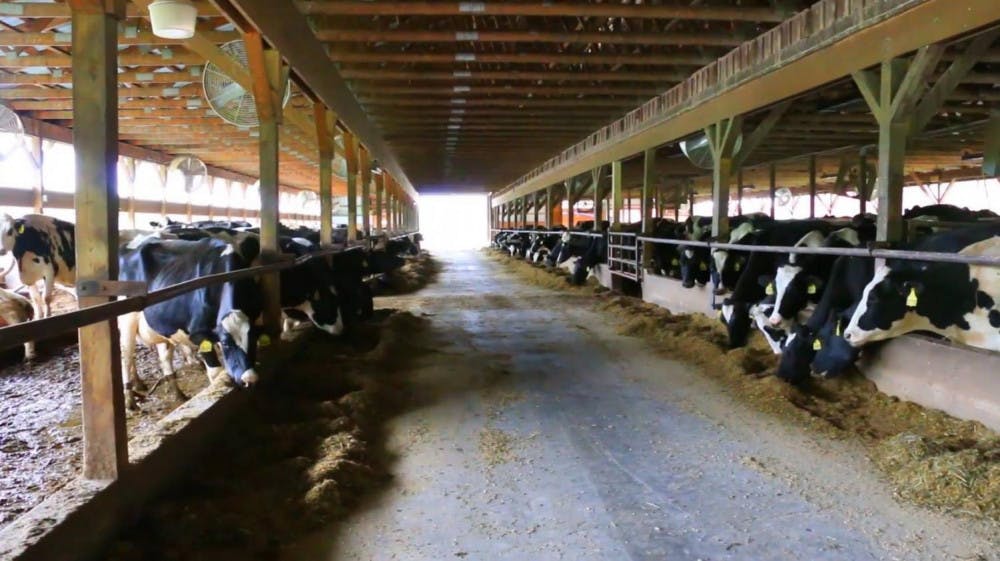The state’s already struggling dairy industry has been destroying its sitting supply of milk in a reluctant response to Covid-19 economic realities. Due to the indefinite shut down of restaurants, schools and businesses, Vermont’s dairy farms have been faced with a steep drop in demand and nowhere to store excess product. A high demand in food retail does not nearly make up for the lack of food service. And across the nation, farmers are destroying the fresh food that they can no longer sell.
“We are deeply concerned about all dairy farms at this moment in time,” said Laura Ginsberg, agricultural development section chief of the Vermont Agency of Agriculture, Food & Markets. “After 4 years of really poor milk prices coming into this, it's not like farmers were set up in a strong financial position, because milk prices have been low for so long now.” Ginsberg anticipates that it will take a toll, but is uncertain how drastic the magnitude of the shock will be in the industry across Vermont and New England.
Prior to the virus outbreak, U.S. dairy farmers overproduced and oversupplied their milk to salvage a shrinking profit. Because agricultural goods are not adjusted to inflation, the surplus lowers milk prices. This forces dairy farmers into a cycle of production expansion in response to price reductions. New England’s small-scale farmers are left especially vulnerable, since the USDA sets milk retail prices at the highly industrialized national standard.
“It’s cheaper to produce milk out west, so their cost of production is lower than ours. And you can't have a large farm in Vermont because of topography and weather, so there's no way we can compete on cost of production. This is a really troublesome spot for our producers,” Ginsberg said.
Doug Dimento, director of corporate communications at Agri-Mark and Cabot, speculates that there may be a fundamental shift in dairying in the Northeast. “Small farmers have been financially fragile,” he said. “We were expected to see rebounds in farm prices this year, but now we expect them to go down over the next few months because of oversupply of milk forcing prices downward.”
Jon Rooney, owner of Monument Farms in Weybridge, where the college sources its milk, has seen significantly reduced demand from restaurant closures. “Due to the fact that Middlebury College students are consuming less and less milk, the lack of [Middlebury College] Food Service has not had a big impact on our fluid milk usage,” Rooney wrote in an email to The Campus. “Restaurant sales represent a substantial portion of our overall business, but it’s the extras, primarily cream, the most valuable portion of the milk, that are piling up.” Ancillary products, such as cheese, sour cream, heavy cream and half & half play a big role in the farm’s overall revenues, but the milk is being dumped rather than processed.
For example, Cabot, a dairy processing company that sources from 160 Vermont dairy farms, is working overtime to alleviate the effects of oversupply. Cabot has four plants that run for 20 hours each day, leaving four hours to sanitize the facility. “We are running full speed, as hard as we can,” Dimento said. “In Springfield, Mass., we’re making butter and milk powder as quickly as we can, but it's not fast enough to absorb all this extra milk.” The Middlebury plant, located on Exchange Street, continues to employ a full staff.
Monument Farms has already been dumping its skim milk for three years. “We had a great need for the cream, but not the skim milk,” Rooney said. Previously, the farm dumped its skim milk into a digester to generate electricity. Monument Farms would truck its milk to a plant, where workers skim off the cream and return the fat-free milk to the farm. Now, the farm dumps full fat milk without selling the cream.
Other co-ops and processing companies claim milk from farmers, only to dump it in mature pits or co-op facilities, according to Ginsberg. “A farmer may not know their milk is getting dumped out, or a farm might have a milk truck come, pump the milk out of the tank, then back up to the manure pit and dump it there,” she said. Ginsberg said that although there is a misperception that individual farmers are making the decision to dump milk, this is never the case — it is ultimately the decision of the cooperative or company with which the farmer is affiliated.
Molly Anderson, professor and director of Food Studies at the college, believes the best solution is for the government to purchase the excess milk from dairy processors and distribute it to food-insecure households. The USDA has allocated $19 billion in Covid-19 relief to the agricultural sector; $3 billion will purchase commodities for food insecure households. “If the processors are selling yogurt, cheese and butter to the government, it means they can take more from the farmers,” Anderson said.
While donating the milk is a potential remedy, it brings new challenges. “We are working on getting that excess fluid milk into the charitable food system,” Ginsberg said. “That is not as easy as it sounds. There are very strict federal regulations on how milk moves through the marketplace.”
The Vermont Agency of Agriculture is working with a number of charitable organizations to bypass these barriers.
“I had a conference call involving Cabot and several other groups to get as much food as we can to the food banks, but we don’t borrow any fluid milk; we have no way to get it: no trucks,” Dimento said.
If milk dumping becomes a long term practice, farmers will eventually reduce their herd numbers to decrease the amount of food, water and other inputs. “There is going to be some killing of cows that wouldn’t otherwise have happened in such a quick manner,” Ginsberg said. Despite recent supply management efforts, this poses a serious threat to farmer income.
"There are going to be lots of tough decisions made on farms,” Dimento said. “We are very scared for what may take place on farms in months ahead.”
As for Monument Farms, Rooney said that he does not plan on reducing his herd size. “Due to the fact that we need to be ready once restaurants open back up,” he said,” it would not be a good idea for us to reduce cow numbers.”
With lack of storage and low demand, dairy farms resort to milk dumping

COURTESY PHOTO
Monument Farms, based in Weybridge, is one of the hundreds of Vermont dairy producers impacted by the economic realities of the Covid-19 outbreak. Demand fluctuation and a lack of infrastructure has given the industry no option but to dump its milk.
Monument Farms, based in Weybridge, is one of the hundreds of Vermont dairy producers impacted by the economic realities of the Covid-19 outbreak. Demand fluctuation and a lack of infrastructure has given the industry no option but to dump its milk.
Comments



